Evaluating Playgroup Participation's Impact on Child Development
VerifiedAdded on 2021/02/19
|11
|3239
|61
Report
AI Summary
This research report investigates the association between playgroup participation, learning competence, and social-emotional wellbeing in Australian children aged four to five. The study explores conceptualisation, the appropriateness of the research design, and the quality of the analysis. It examines how playgroup involvement influences children's development, including language, literacy, and social skills. The research highlights the importance of early childhood education, teacher instruction, and parental involvement in fostering children's learning and overall wellbeing. The report also discusses the challenges in evaluating the benefits of playgroups and the need for comprehensive data collection methods to understand the impact of playgroup participation on children's outcomes. The analysis includes a descriptive research method to measure the association between playgroup participation and learning competence. The report concludes with a discussion of the implications of these findings for educational practices and policies, emphasizing the need for inclusive programs that support children from diverse backgrounds.
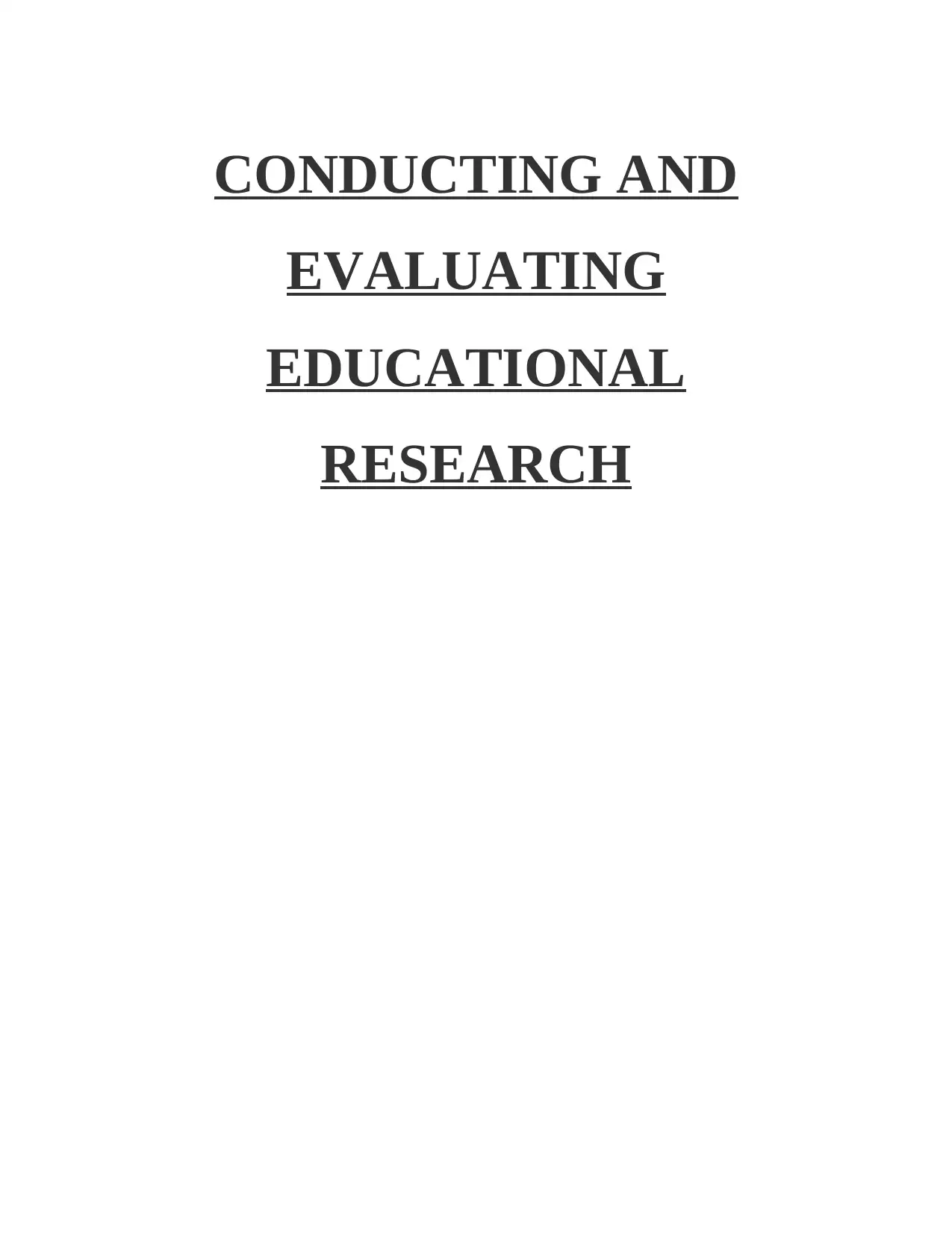
CONDUCTING AND
EVALUATING
EDUCATIONAL
RESEARCH
EVALUATING
EDUCATIONAL
RESEARCH
Paraphrase This Document
Need a fresh take? Get an instant paraphrase of this document with our AI Paraphraser
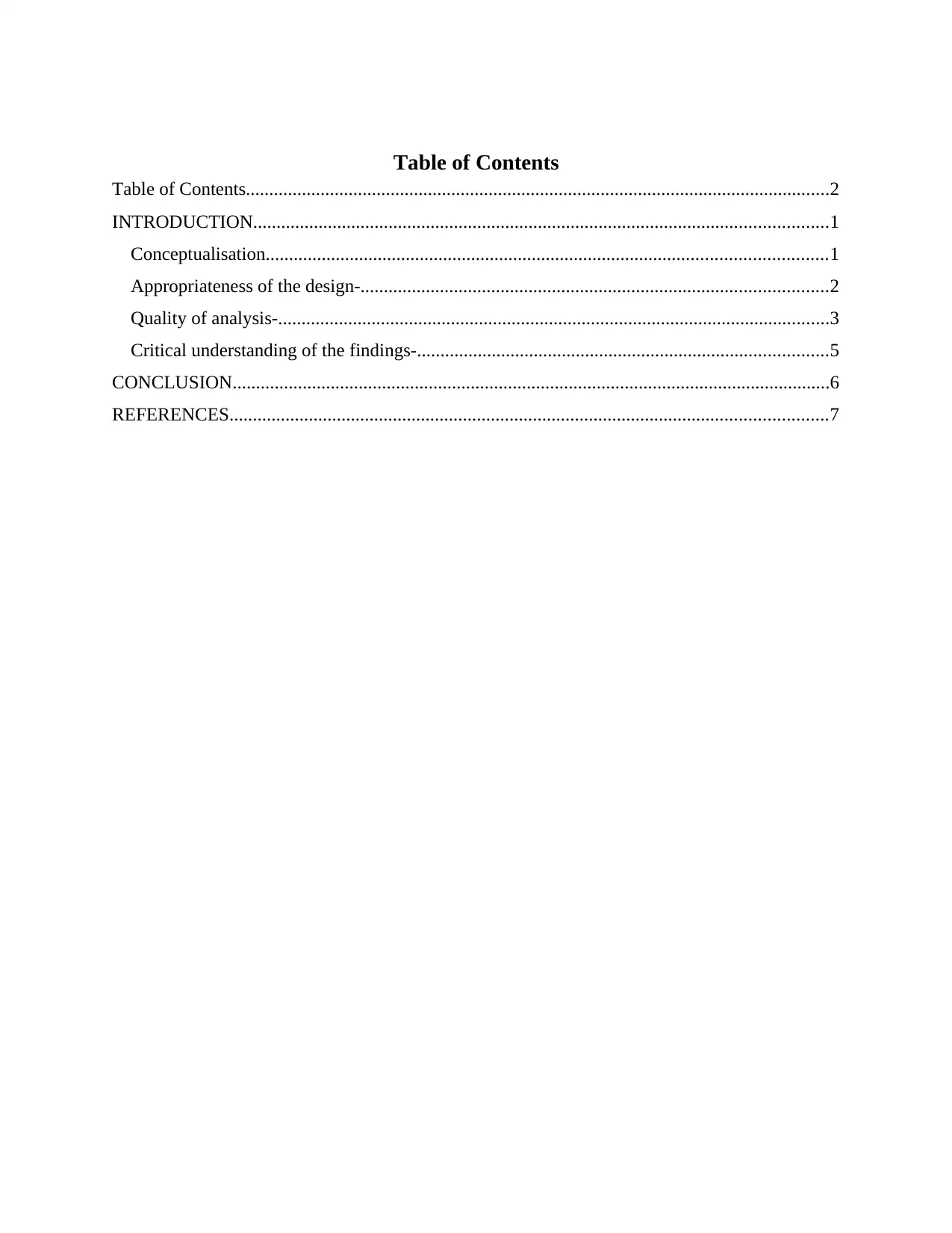
Table of Contents
Table of Contents.............................................................................................................................2
INTRODUCTION...........................................................................................................................1
Conceptualisation........................................................................................................................1
Appropriateness of the design-....................................................................................................2
Quality of analysis-......................................................................................................................3
Critical understanding of the findings-........................................................................................5
CONCLUSION................................................................................................................................6
REFERENCES................................................................................................................................7
Table of Contents.............................................................................................................................2
INTRODUCTION...........................................................................................................................1
Conceptualisation........................................................................................................................1
Appropriateness of the design-....................................................................................................2
Quality of analysis-......................................................................................................................3
Critical understanding of the findings-........................................................................................5
CONCLUSION................................................................................................................................6
REFERENCES................................................................................................................................7
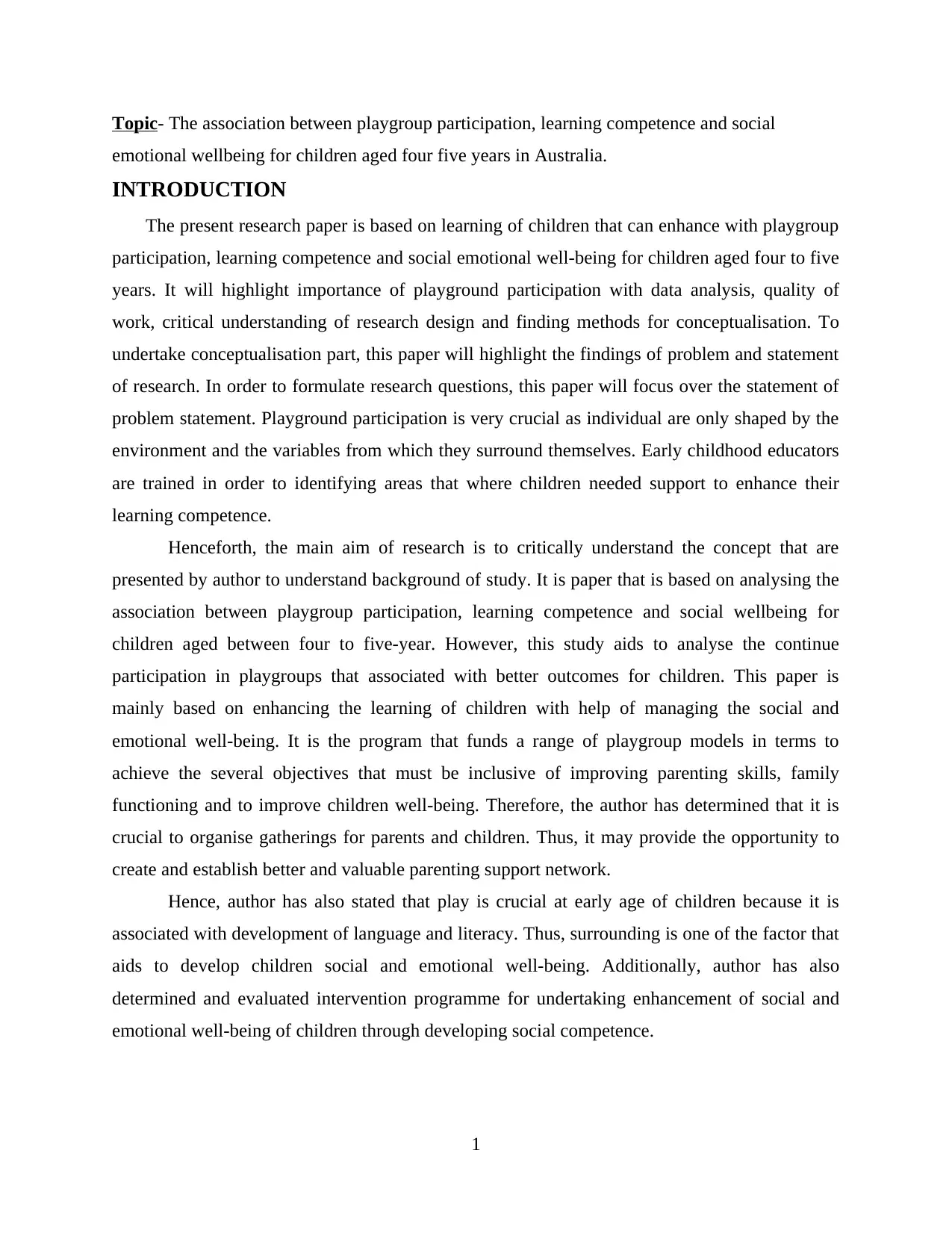
Topic- The association between playgroup participation, learning competence and social
emotional wellbeing for children aged four five years in Australia.
INTRODUCTION
The present research paper is based on learning of children that can enhance with playgroup
participation, learning competence and social emotional well-being for children aged four to five
years. It will highlight importance of playground participation with data analysis, quality of
work, critical understanding of research design and finding methods for conceptualisation. To
undertake conceptualisation part, this paper will highlight the findings of problem and statement
of research. In order to formulate research questions, this paper will focus over the statement of
problem statement. Playground participation is very crucial as individual are only shaped by the
environment and the variables from which they surround themselves. Early childhood educators
are trained in order to identifying areas that where children needed support to enhance their
learning competence.
Henceforth, the main aim of research is to critically understand the concept that are
presented by author to understand background of study. It is paper that is based on analysing the
association between playgroup participation, learning competence and social wellbeing for
children aged between four to five-year. However, this study aids to analyse the continue
participation in playgroups that associated with better outcomes for children. This paper is
mainly based on enhancing the learning of children with help of managing the social and
emotional well-being. It is the program that funds a range of playgroup models in terms to
achieve the several objectives that must be inclusive of improving parenting skills, family
functioning and to improve children well-being. Therefore, the author has determined that it is
crucial to organise gatherings for parents and children. Thus, it may provide the opportunity to
create and establish better and valuable parenting support network.
Hence, author has also stated that play is crucial at early age of children because it is
associated with development of language and literacy. Thus, surrounding is one of the factor that
aids to develop children social and emotional well-being. Additionally, author has also
determined and evaluated intervention programme for undertaking enhancement of social and
emotional well-being of children through developing social competence.
1
emotional wellbeing for children aged four five years in Australia.
INTRODUCTION
The present research paper is based on learning of children that can enhance with playgroup
participation, learning competence and social emotional well-being for children aged four to five
years. It will highlight importance of playground participation with data analysis, quality of
work, critical understanding of research design and finding methods for conceptualisation. To
undertake conceptualisation part, this paper will highlight the findings of problem and statement
of research. In order to formulate research questions, this paper will focus over the statement of
problem statement. Playground participation is very crucial as individual are only shaped by the
environment and the variables from which they surround themselves. Early childhood educators
are trained in order to identifying areas that where children needed support to enhance their
learning competence.
Henceforth, the main aim of research is to critically understand the concept that are
presented by author to understand background of study. It is paper that is based on analysing the
association between playgroup participation, learning competence and social wellbeing for
children aged between four to five-year. However, this study aids to analyse the continue
participation in playgroups that associated with better outcomes for children. This paper is
mainly based on enhancing the learning of children with help of managing the social and
emotional well-being. It is the program that funds a range of playgroup models in terms to
achieve the several objectives that must be inclusive of improving parenting skills, family
functioning and to improve children well-being. Therefore, the author has determined that it is
crucial to organise gatherings for parents and children. Thus, it may provide the opportunity to
create and establish better and valuable parenting support network.
Hence, author has also stated that play is crucial at early age of children because it is
associated with development of language and literacy. Thus, surrounding is one of the factor that
aids to develop children social and emotional well-being. Additionally, author has also
determined and evaluated intervention programme for undertaking enhancement of social and
emotional well-being of children through developing social competence.
1
⊘ This is a preview!⊘
Do you want full access?
Subscribe today to unlock all pages.

Trusted by 1+ million students worldwide
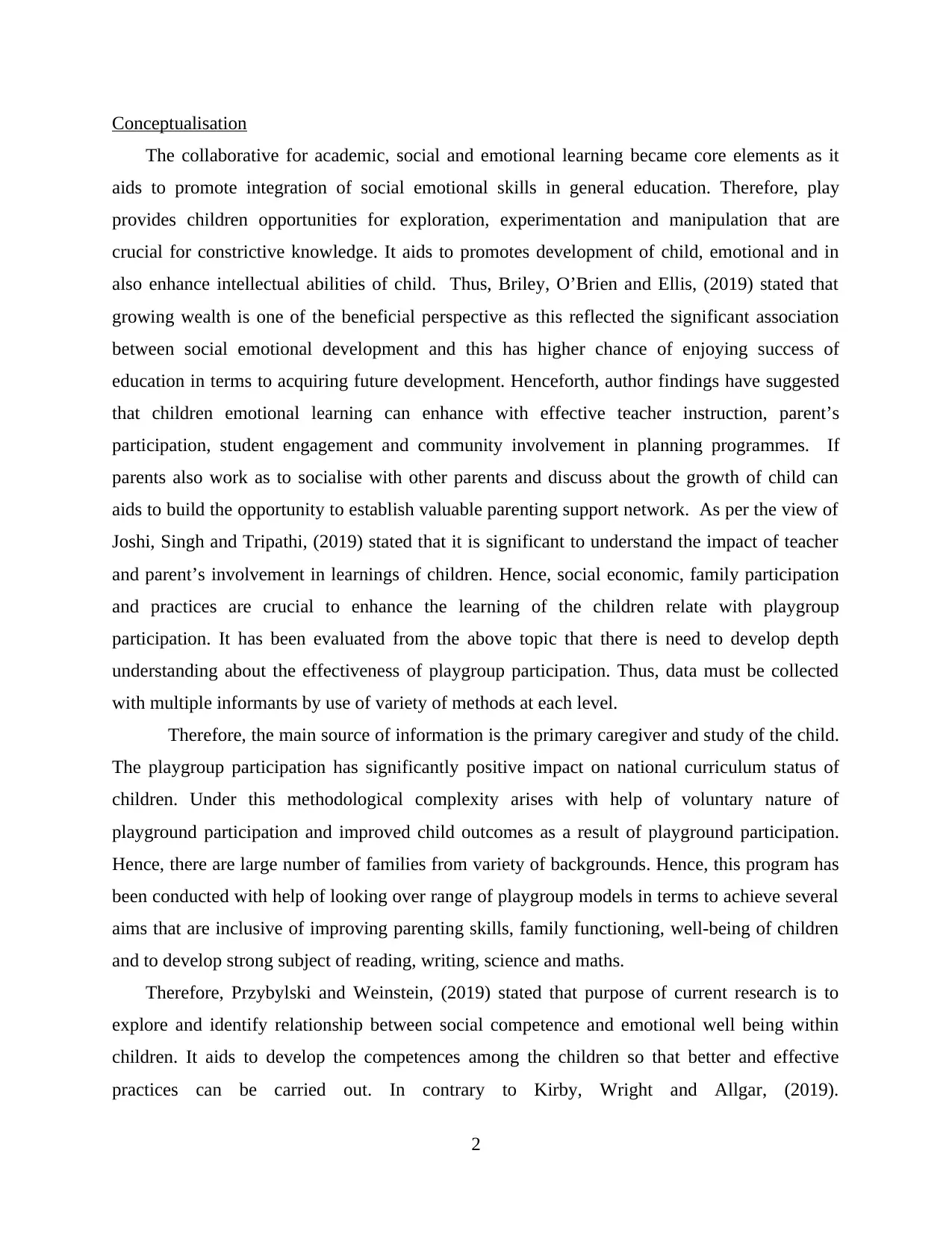
Conceptualisation
The collaborative for academic, social and emotional learning became core elements as it
aids to promote integration of social emotional skills in general education. Therefore, play
provides children opportunities for exploration, experimentation and manipulation that are
crucial for constrictive knowledge. It aids to promotes development of child, emotional and in
also enhance intellectual abilities of child. Thus, Briley, O’Brien and Ellis, (2019) stated that
growing wealth is one of the beneficial perspective as this reflected the significant association
between social emotional development and this has higher chance of enjoying success of
education in terms to acquiring future development. Henceforth, author findings have suggested
that children emotional learning can enhance with effective teacher instruction, parent’s
participation, student engagement and community involvement in planning programmes. If
parents also work as to socialise with other parents and discuss about the growth of child can
aids to build the opportunity to establish valuable parenting support network. As per the view of
Joshi, Singh and Tripathi, (2019) stated that it is significant to understand the impact of teacher
and parent’s involvement in learnings of children. Hence, social economic, family participation
and practices are crucial to enhance the learning of the children relate with playgroup
participation. It has been evaluated from the above topic that there is need to develop depth
understanding about the effectiveness of playgroup participation. Thus, data must be collected
with multiple informants by use of variety of methods at each level.
Therefore, the main source of information is the primary caregiver and study of the child.
The playgroup participation has significantly positive impact on national curriculum status of
children. Under this methodological complexity arises with help of voluntary nature of
playground participation and improved child outcomes as a result of playground participation.
Hence, there are large number of families from variety of backgrounds. Hence, this program has
been conducted with help of looking over range of playgroup models in terms to achieve several
aims that are inclusive of improving parenting skills, family functioning, well-being of children
and to develop strong subject of reading, writing, science and maths.
Therefore, Przybylski and Weinstein, (2019) stated that purpose of current research is to
explore and identify relationship between social competence and emotional well being within
children. It aids to develop the competences among the children so that better and effective
practices can be carried out. In contrary to Kirby, Wright and Allgar, (2019).
2
The collaborative for academic, social and emotional learning became core elements as it
aids to promote integration of social emotional skills in general education. Therefore, play
provides children opportunities for exploration, experimentation and manipulation that are
crucial for constrictive knowledge. It aids to promotes development of child, emotional and in
also enhance intellectual abilities of child. Thus, Briley, O’Brien and Ellis, (2019) stated that
growing wealth is one of the beneficial perspective as this reflected the significant association
between social emotional development and this has higher chance of enjoying success of
education in terms to acquiring future development. Henceforth, author findings have suggested
that children emotional learning can enhance with effective teacher instruction, parent’s
participation, student engagement and community involvement in planning programmes. If
parents also work as to socialise with other parents and discuss about the growth of child can
aids to build the opportunity to establish valuable parenting support network. As per the view of
Joshi, Singh and Tripathi, (2019) stated that it is significant to understand the impact of teacher
and parent’s involvement in learnings of children. Hence, social economic, family participation
and practices are crucial to enhance the learning of the children relate with playgroup
participation. It has been evaluated from the above topic that there is need to develop depth
understanding about the effectiveness of playgroup participation. Thus, data must be collected
with multiple informants by use of variety of methods at each level.
Therefore, the main source of information is the primary caregiver and study of the child.
The playgroup participation has significantly positive impact on national curriculum status of
children. Under this methodological complexity arises with help of voluntary nature of
playground participation and improved child outcomes as a result of playground participation.
Hence, there are large number of families from variety of backgrounds. Hence, this program has
been conducted with help of looking over range of playgroup models in terms to achieve several
aims that are inclusive of improving parenting skills, family functioning, well-being of children
and to develop strong subject of reading, writing, science and maths.
Therefore, Przybylski and Weinstein, (2019) stated that purpose of current research is to
explore and identify relationship between social competence and emotional well being within
children. It aids to develop the competences among the children so that better and effective
practices can be carried out. In contrary to Kirby, Wright and Allgar, (2019).
2
Paraphrase This Document
Need a fresh take? Get an instant paraphrase of this document with our AI Paraphraser
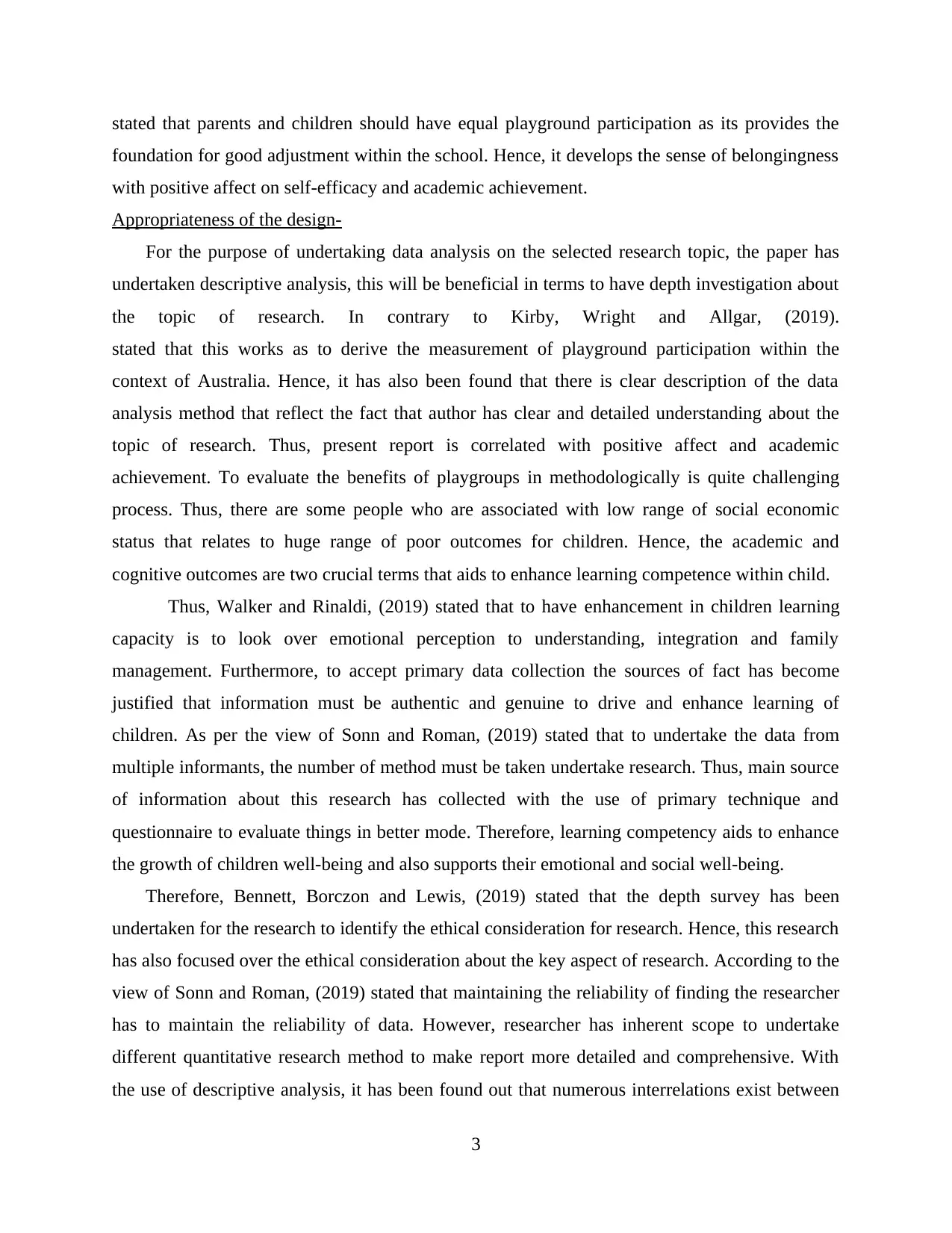
stated that parents and children should have equal playground participation as its provides the
foundation for good adjustment within the school. Hence, it develops the sense of belongingness
with positive affect on self-efficacy and academic achievement.
Appropriateness of the design-
For the purpose of undertaking data analysis on the selected research topic, the paper has
undertaken descriptive analysis, this will be beneficial in terms to have depth investigation about
the topic of research. In contrary to Kirby, Wright and Allgar, (2019).
stated that this works as to derive the measurement of playground participation within the
context of Australia. Hence, it has also been found that there is clear description of the data
analysis method that reflect the fact that author has clear and detailed understanding about the
topic of research. Thus, present report is correlated with positive affect and academic
achievement. To evaluate the benefits of playgroups in methodologically is quite challenging
process. Thus, there are some people who are associated with low range of social economic
status that relates to huge range of poor outcomes for children. Hence, the academic and
cognitive outcomes are two crucial terms that aids to enhance learning competence within child.
Thus, Walker and Rinaldi, (2019) stated that to have enhancement in children learning
capacity is to look over emotional perception to understanding, integration and family
management. Furthermore, to accept primary data collection the sources of fact has become
justified that information must be authentic and genuine to drive and enhance learning of
children. As per the view of Sonn and Roman, (2019) stated that to undertake the data from
multiple informants, the number of method must be taken undertake research. Thus, main source
of information about this research has collected with the use of primary technique and
questionnaire to evaluate things in better mode. Therefore, learning competency aids to enhance
the growth of children well-being and also supports their emotional and social well-being.
Therefore, Bennett, Borczon and Lewis, (2019) stated that the depth survey has been
undertaken for the research to identify the ethical consideration for research. Hence, this research
has also focused over the ethical consideration about the key aspect of research. According to the
view of Sonn and Roman, (2019) stated that maintaining the reliability of finding the researcher
has to maintain the reliability of data. However, researcher has inherent scope to undertake
different quantitative research method to make report more detailed and comprehensive. With
the use of descriptive analysis, it has been found out that numerous interrelations exist between
3
foundation for good adjustment within the school. Hence, it develops the sense of belongingness
with positive affect on self-efficacy and academic achievement.
Appropriateness of the design-
For the purpose of undertaking data analysis on the selected research topic, the paper has
undertaken descriptive analysis, this will be beneficial in terms to have depth investigation about
the topic of research. In contrary to Kirby, Wright and Allgar, (2019).
stated that this works as to derive the measurement of playground participation within the
context of Australia. Hence, it has also been found that there is clear description of the data
analysis method that reflect the fact that author has clear and detailed understanding about the
topic of research. Thus, present report is correlated with positive affect and academic
achievement. To evaluate the benefits of playgroups in methodologically is quite challenging
process. Thus, there are some people who are associated with low range of social economic
status that relates to huge range of poor outcomes for children. Hence, the academic and
cognitive outcomes are two crucial terms that aids to enhance learning competence within child.
Thus, Walker and Rinaldi, (2019) stated that to have enhancement in children learning
capacity is to look over emotional perception to understanding, integration and family
management. Furthermore, to accept primary data collection the sources of fact has become
justified that information must be authentic and genuine to drive and enhance learning of
children. As per the view of Sonn and Roman, (2019) stated that to undertake the data from
multiple informants, the number of method must be taken undertake research. Thus, main source
of information about this research has collected with the use of primary technique and
questionnaire to evaluate things in better mode. Therefore, learning competency aids to enhance
the growth of children well-being and also supports their emotional and social well-being.
Therefore, Bennett, Borczon and Lewis, (2019) stated that the depth survey has been
undertaken for the research to identify the ethical consideration for research. Hence, this research
has also focused over the ethical consideration about the key aspect of research. According to the
view of Sonn and Roman, (2019) stated that maintaining the reliability of finding the researcher
has to maintain the reliability of data. However, researcher has inherent scope to undertake
different quantitative research method to make report more detailed and comprehensive. With
the use of descriptive analysis, it has been found out that numerous interrelations exist between
3
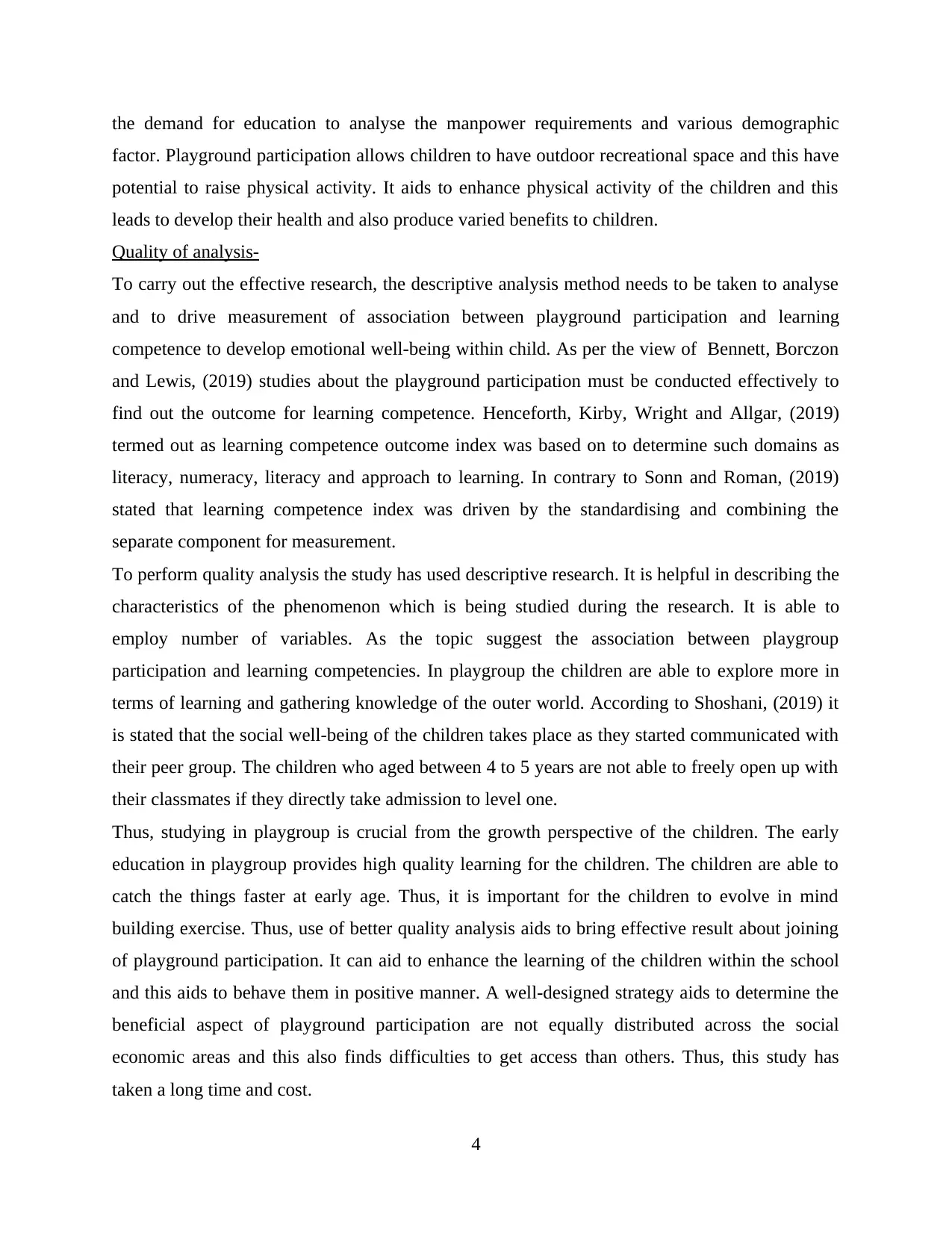
the demand for education to analyse the manpower requirements and various demographic
factor. Playground participation allows children to have outdoor recreational space and this have
potential to raise physical activity. It aids to enhance physical activity of the children and this
leads to develop their health and also produce varied benefits to children.
Quality of analysis-
To carry out the effective research, the descriptive analysis method needs to be taken to analyse
and to drive measurement of association between playground participation and learning
competence to develop emotional well-being within child. As per the view of Bennett, Borczon
and Lewis, (2019) studies about the playground participation must be conducted effectively to
find out the outcome for learning competence. Henceforth, Kirby, Wright and Allgar, (2019)
termed out as learning competence outcome index was based on to determine such domains as
literacy, numeracy, literacy and approach to learning. In contrary to Sonn and Roman, (2019)
stated that learning competence index was driven by the standardising and combining the
separate component for measurement.
To perform quality analysis the study has used descriptive research. It is helpful in describing the
characteristics of the phenomenon which is being studied during the research. It is able to
employ number of variables. As the topic suggest the association between playgroup
participation and learning competencies. In playgroup the children are able to explore more in
terms of learning and gathering knowledge of the outer world. According to Shoshani, (2019) it
is stated that the social well-being of the children takes place as they started communicated with
their peer group. The children who aged between 4 to 5 years are not able to freely open up with
their classmates if they directly take admission to level one.
Thus, studying in playgroup is crucial from the growth perspective of the children. The early
education in playgroup provides high quality learning for the children. The children are able to
catch the things faster at early age. Thus, it is important for the children to evolve in mind
building exercise. Thus, use of better quality analysis aids to bring effective result about joining
of playground participation. It can aid to enhance the learning of the children within the school
and this aids to behave them in positive manner. A well-designed strategy aids to determine the
beneficial aspect of playground participation are not equally distributed across the social
economic areas and this also finds difficulties to get access than others. Thus, this study has
taken a long time and cost.
4
factor. Playground participation allows children to have outdoor recreational space and this have
potential to raise physical activity. It aids to enhance physical activity of the children and this
leads to develop their health and also produce varied benefits to children.
Quality of analysis-
To carry out the effective research, the descriptive analysis method needs to be taken to analyse
and to drive measurement of association between playground participation and learning
competence to develop emotional well-being within child. As per the view of Bennett, Borczon
and Lewis, (2019) studies about the playground participation must be conducted effectively to
find out the outcome for learning competence. Henceforth, Kirby, Wright and Allgar, (2019)
termed out as learning competence outcome index was based on to determine such domains as
literacy, numeracy, literacy and approach to learning. In contrary to Sonn and Roman, (2019)
stated that learning competence index was driven by the standardising and combining the
separate component for measurement.
To perform quality analysis the study has used descriptive research. It is helpful in describing the
characteristics of the phenomenon which is being studied during the research. It is able to
employ number of variables. As the topic suggest the association between playgroup
participation and learning competencies. In playgroup the children are able to explore more in
terms of learning and gathering knowledge of the outer world. According to Shoshani, (2019) it
is stated that the social well-being of the children takes place as they started communicated with
their peer group. The children who aged between 4 to 5 years are not able to freely open up with
their classmates if they directly take admission to level one.
Thus, studying in playgroup is crucial from the growth perspective of the children. The early
education in playgroup provides high quality learning for the children. The children are able to
catch the things faster at early age. Thus, it is important for the children to evolve in mind
building exercise. Thus, use of better quality analysis aids to bring effective result about joining
of playground participation. It can aid to enhance the learning of the children within the school
and this aids to behave them in positive manner. A well-designed strategy aids to determine the
beneficial aspect of playground participation are not equally distributed across the social
economic areas and this also finds difficulties to get access than others. Thus, this study has
taken a long time and cost.
4
⊘ This is a preview!⊘
Do you want full access?
Subscribe today to unlock all pages.

Trusted by 1+ million students worldwide
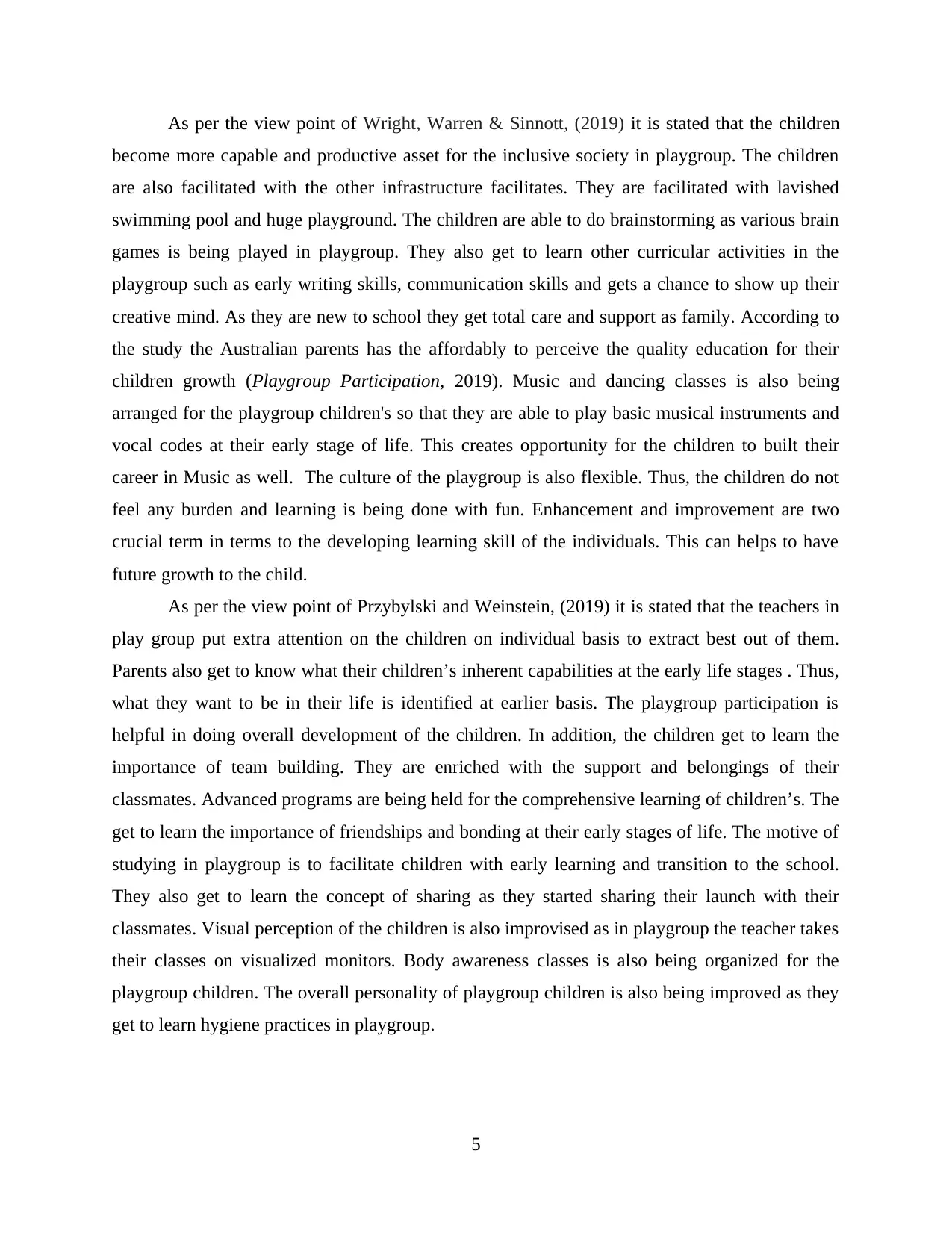
As per the view point of Wright, Warren & Sinnott, (2019) it is stated that the children
become more capable and productive asset for the inclusive society in playgroup. The children
are also facilitated with the other infrastructure facilitates. They are facilitated with lavished
swimming pool and huge playground. The children are able to do brainstorming as various brain
games is being played in playgroup. They also get to learn other curricular activities in the
playgroup such as early writing skills, communication skills and gets a chance to show up their
creative mind. As they are new to school they get total care and support as family. According to
the study the Australian parents has the affordably to perceive the quality education for their
children growth (Playgroup Participation, 2019). Music and dancing classes is also being
arranged for the playgroup children's so that they are able to play basic musical instruments and
vocal codes at their early stage of life. This creates opportunity for the children to built their
career in Music as well. The culture of the playgroup is also flexible. Thus, the children do not
feel any burden and learning is being done with fun. Enhancement and improvement are two
crucial term in terms to the developing learning skill of the individuals. This can helps to have
future growth to the child.
As per the view point of Przybylski and Weinstein, (2019) it is stated that the teachers in
play group put extra attention on the children on individual basis to extract best out of them.
Parents also get to know what their children’s inherent capabilities at the early life stages . Thus,
what they want to be in their life is identified at earlier basis. The playgroup participation is
helpful in doing overall development of the children. In addition, the children get to learn the
importance of team building. They are enriched with the support and belongings of their
classmates. Advanced programs are being held for the comprehensive learning of children’s. The
get to learn the importance of friendships and bonding at their early stages of life. The motive of
studying in playgroup is to facilitate children with early learning and transition to the school.
They also get to learn the concept of sharing as they started sharing their launch with their
classmates. Visual perception of the children is also improvised as in playgroup the teacher takes
their classes on visualized monitors. Body awareness classes is also being organized for the
playgroup children. The overall personality of playgroup children is also being improved as they
get to learn hygiene practices in playgroup.
5
become more capable and productive asset for the inclusive society in playgroup. The children
are also facilitated with the other infrastructure facilitates. They are facilitated with lavished
swimming pool and huge playground. The children are able to do brainstorming as various brain
games is being played in playgroup. They also get to learn other curricular activities in the
playgroup such as early writing skills, communication skills and gets a chance to show up their
creative mind. As they are new to school they get total care and support as family. According to
the study the Australian parents has the affordably to perceive the quality education for their
children growth (Playgroup Participation, 2019). Music and dancing classes is also being
arranged for the playgroup children's so that they are able to play basic musical instruments and
vocal codes at their early stage of life. This creates opportunity for the children to built their
career in Music as well. The culture of the playgroup is also flexible. Thus, the children do not
feel any burden and learning is being done with fun. Enhancement and improvement are two
crucial term in terms to the developing learning skill of the individuals. This can helps to have
future growth to the child.
As per the view point of Przybylski and Weinstein, (2019) it is stated that the teachers in
play group put extra attention on the children on individual basis to extract best out of them.
Parents also get to know what their children’s inherent capabilities at the early life stages . Thus,
what they want to be in their life is identified at earlier basis. The playgroup participation is
helpful in doing overall development of the children. In addition, the children get to learn the
importance of team building. They are enriched with the support and belongings of their
classmates. Advanced programs are being held for the comprehensive learning of children’s. The
get to learn the importance of friendships and bonding at their early stages of life. The motive of
studying in playgroup is to facilitate children with early learning and transition to the school.
They also get to learn the concept of sharing as they started sharing their launch with their
classmates. Visual perception of the children is also improvised as in playgroup the teacher takes
their classes on visualized monitors. Body awareness classes is also being organized for the
playgroup children. The overall personality of playgroup children is also being improved as they
get to learn hygiene practices in playgroup.
5
Paraphrase This Document
Need a fresh take? Get an instant paraphrase of this document with our AI Paraphraser
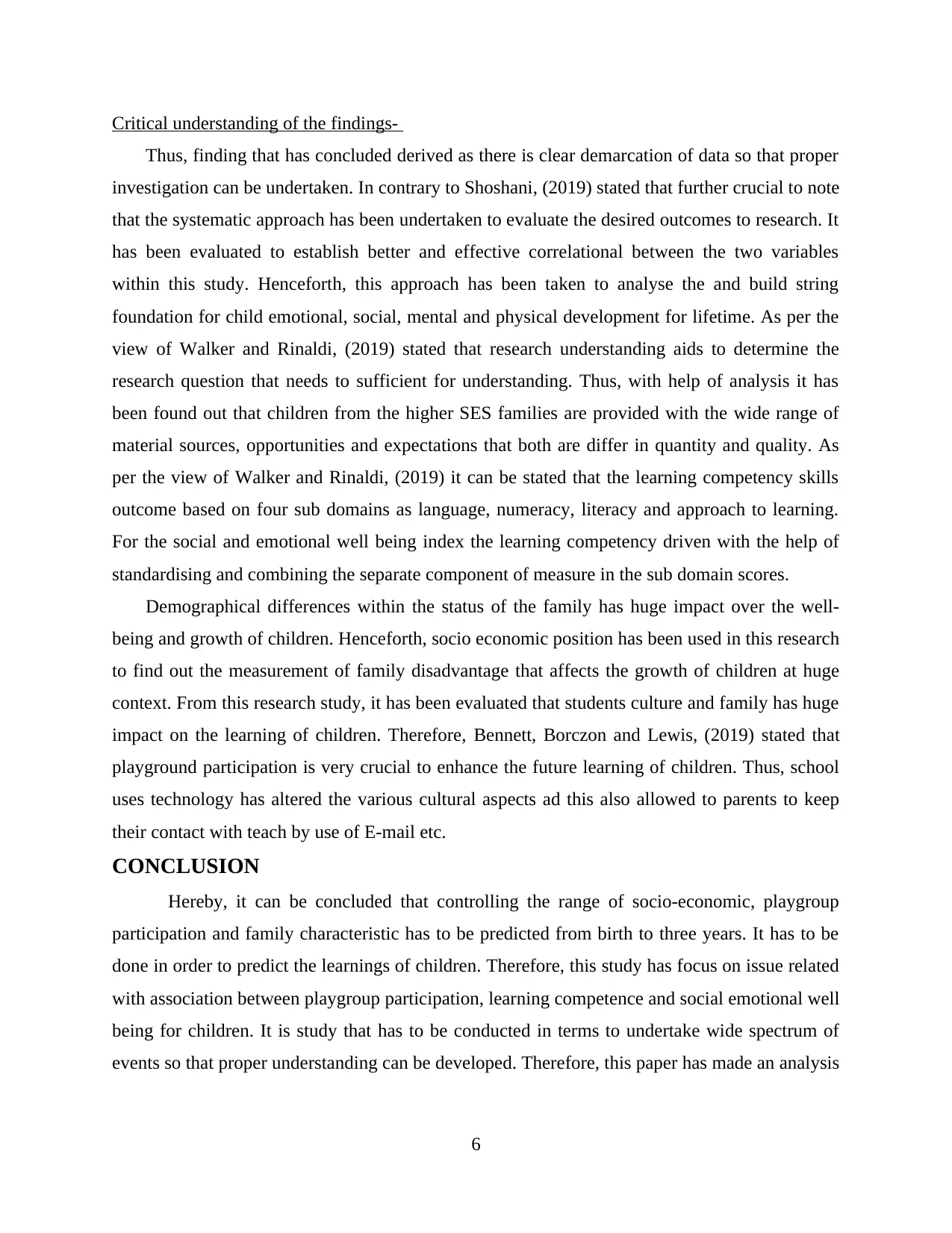
Critical understanding of the findings-
Thus, finding that has concluded derived as there is clear demarcation of data so that proper
investigation can be undertaken. In contrary to Shoshani, (2019) stated that further crucial to note
that the systematic approach has been undertaken to evaluate the desired outcomes to research. It
has been evaluated to establish better and effective correlational between the two variables
within this study. Henceforth, this approach has been taken to analyse the and build string
foundation for child emotional, social, mental and physical development for lifetime. As per the
view of Walker and Rinaldi, (2019) stated that research understanding aids to determine the
research question that needs to sufficient for understanding. Thus, with help of analysis it has
been found out that children from the higher SES families are provided with the wide range of
material sources, opportunities and expectations that both are differ in quantity and quality. As
per the view of Walker and Rinaldi, (2019) it can be stated that the learning competency skills
outcome based on four sub domains as language, numeracy, literacy and approach to learning.
For the social and emotional well being index the learning competency driven with the help of
standardising and combining the separate component of measure in the sub domain scores.
Demographical differences within the status of the family has huge impact over the well-
being and growth of children. Henceforth, socio economic position has been used in this research
to find out the measurement of family disadvantage that affects the growth of children at huge
context. From this research study, it has been evaluated that students culture and family has huge
impact on the learning of children. Therefore, Bennett, Borczon and Lewis, (2019) stated that
playground participation is very crucial to enhance the future learning of children. Thus, school
uses technology has altered the various cultural aspects ad this also allowed to parents to keep
their contact with teach by use of E-mail etc.
CONCLUSION
Hereby, it can be concluded that controlling the range of socio-economic, playgroup
participation and family characteristic has to be predicted from birth to three years. It has to be
done in order to predict the learnings of children. Therefore, this study has focus on issue related
with association between playgroup participation, learning competence and social emotional well
being for children. It is study that has to be conducted in terms to undertake wide spectrum of
events so that proper understanding can be developed. Therefore, this paper has made an analysis
6
Thus, finding that has concluded derived as there is clear demarcation of data so that proper
investigation can be undertaken. In contrary to Shoshani, (2019) stated that further crucial to note
that the systematic approach has been undertaken to evaluate the desired outcomes to research. It
has been evaluated to establish better and effective correlational between the two variables
within this study. Henceforth, this approach has been taken to analyse the and build string
foundation for child emotional, social, mental and physical development for lifetime. As per the
view of Walker and Rinaldi, (2019) stated that research understanding aids to determine the
research question that needs to sufficient for understanding. Thus, with help of analysis it has
been found out that children from the higher SES families are provided with the wide range of
material sources, opportunities and expectations that both are differ in quantity and quality. As
per the view of Walker and Rinaldi, (2019) it can be stated that the learning competency skills
outcome based on four sub domains as language, numeracy, literacy and approach to learning.
For the social and emotional well being index the learning competency driven with the help of
standardising and combining the separate component of measure in the sub domain scores.
Demographical differences within the status of the family has huge impact over the well-
being and growth of children. Henceforth, socio economic position has been used in this research
to find out the measurement of family disadvantage that affects the growth of children at huge
context. From this research study, it has been evaluated that students culture and family has huge
impact on the learning of children. Therefore, Bennett, Borczon and Lewis, (2019) stated that
playground participation is very crucial to enhance the future learning of children. Thus, school
uses technology has altered the various cultural aspects ad this also allowed to parents to keep
their contact with teach by use of E-mail etc.
CONCLUSION
Hereby, it can be concluded that controlling the range of socio-economic, playgroup
participation and family characteristic has to be predicted from birth to three years. It has to be
done in order to predict the learnings of children. Therefore, this study has focus on issue related
with association between playgroup participation, learning competence and social emotional well
being for children. It is study that has to be conducted in terms to undertake wide spectrum of
events so that proper understanding can be developed. Therefore, this paper has made an analysis
6

to find out the depth impact on overall academic achievements of the child by developing
emotional wellbeing within the child.
7
emotional wellbeing within the child.
7
⊘ This is a preview!⊘
Do you want full access?
Subscribe today to unlock all pages.

Trusted by 1+ million students worldwide
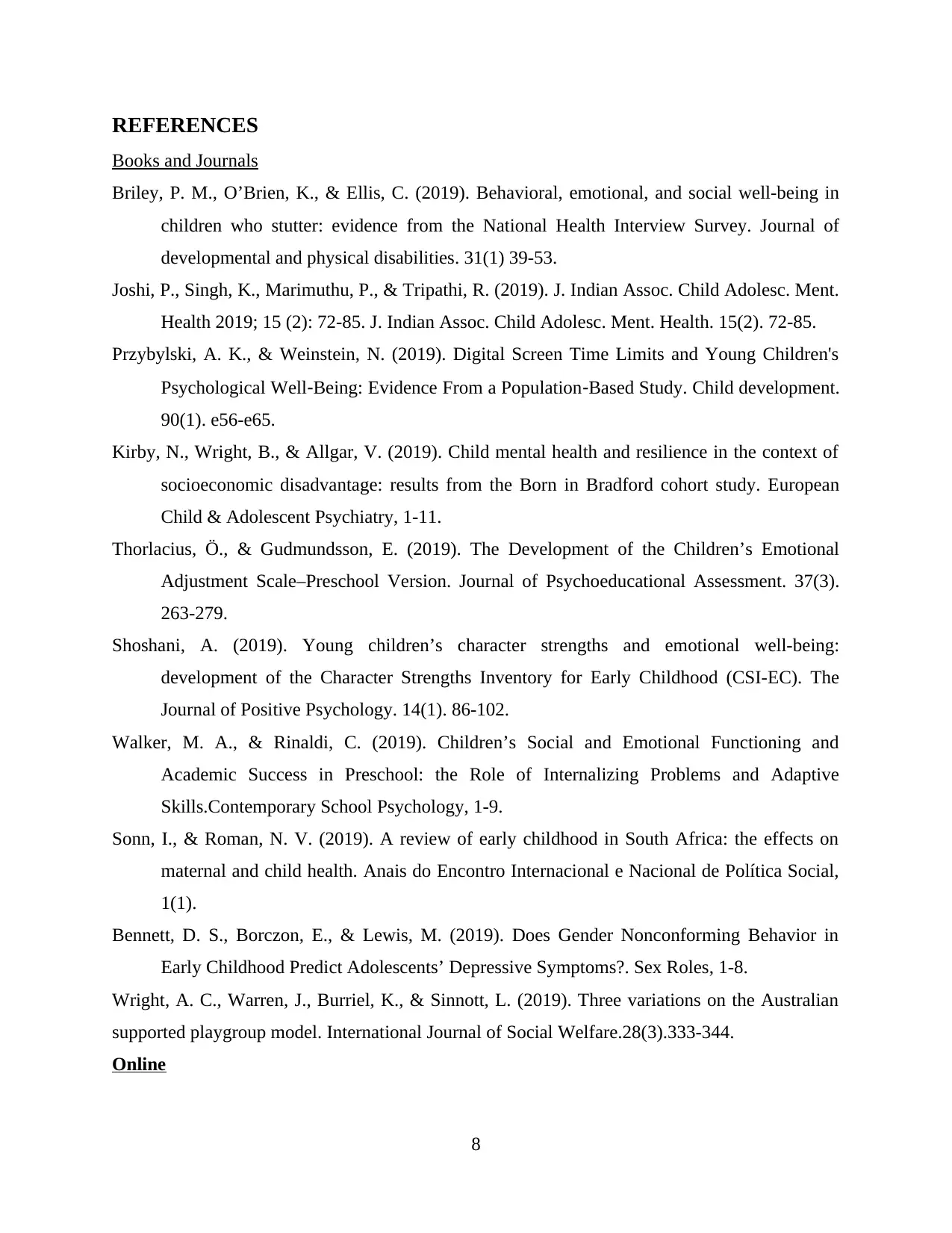
REFERENCES
Books and Journals
Briley, P. M., O’Brien, K., & Ellis, C. (2019). Behavioral, emotional, and social well-being in
children who stutter: evidence from the National Health Interview Survey. Journal of
developmental and physical disabilities. 31(1) 39-53.
Joshi, P., Singh, K., Marimuthu, P., & Tripathi, R. (2019). J. Indian Assoc. Child Adolesc. Ment.
Health 2019; 15 (2): 72-85. J. Indian Assoc. Child Adolesc. Ment. Health. 15(2). 72-85.
Przybylski, A. K., & Weinstein, N. (2019). Digital Screen Time Limits and Young Children's
Psychological Well‐Being: Evidence From a Population‐Based Study. Child development.
90(1). e56-e65.
Kirby, N., Wright, B., & Allgar, V. (2019). Child mental health and resilience in the context of
socioeconomic disadvantage: results from the Born in Bradford cohort study. European
Child & Adolescent Psychiatry, 1-11.
Thorlacius, Ö., & Gudmundsson, E. (2019). The Development of the Children’s Emotional
Adjustment Scale–Preschool Version. Journal of Psychoeducational Assessment. 37(3).
263-279.
Shoshani, A. (2019). Young children’s character strengths and emotional well-being:
development of the Character Strengths Inventory for Early Childhood (CSI-EC). The
Journal of Positive Psychology. 14(1). 86-102.
Walker, M. A., & Rinaldi, C. (2019). Children’s Social and Emotional Functioning and
Academic Success in Preschool: the Role of Internalizing Problems and Adaptive
Skills.Contemporary School Psychology, 1-9.
Sonn, I., & Roman, N. V. (2019). A review of early childhood in South Africa: the effects on
maternal and child health. Anais do Encontro Internacional e Nacional de Política Social,
1(1).
Bennett, D. S., Borczon, E., & Lewis, M. (2019). Does Gender Nonconforming Behavior in
Early Childhood Predict Adolescents’ Depressive Symptoms?. Sex Roles, 1-8.
Wright, A. C., Warren, J., Burriel, K., & Sinnott, L. (2019). Three variations on the Australian
supported playgroup model. International Journal of Social Welfare.28(3).333-344.
Online
8
Books and Journals
Briley, P. M., O’Brien, K., & Ellis, C. (2019). Behavioral, emotional, and social well-being in
children who stutter: evidence from the National Health Interview Survey. Journal of
developmental and physical disabilities. 31(1) 39-53.
Joshi, P., Singh, K., Marimuthu, P., & Tripathi, R. (2019). J. Indian Assoc. Child Adolesc. Ment.
Health 2019; 15 (2): 72-85. J. Indian Assoc. Child Adolesc. Ment. Health. 15(2). 72-85.
Przybylski, A. K., & Weinstein, N. (2019). Digital Screen Time Limits and Young Children's
Psychological Well‐Being: Evidence From a Population‐Based Study. Child development.
90(1). e56-e65.
Kirby, N., Wright, B., & Allgar, V. (2019). Child mental health and resilience in the context of
socioeconomic disadvantage: results from the Born in Bradford cohort study. European
Child & Adolescent Psychiatry, 1-11.
Thorlacius, Ö., & Gudmundsson, E. (2019). The Development of the Children’s Emotional
Adjustment Scale–Preschool Version. Journal of Psychoeducational Assessment. 37(3).
263-279.
Shoshani, A. (2019). Young children’s character strengths and emotional well-being:
development of the Character Strengths Inventory for Early Childhood (CSI-EC). The
Journal of Positive Psychology. 14(1). 86-102.
Walker, M. A., & Rinaldi, C. (2019). Children’s Social and Emotional Functioning and
Academic Success in Preschool: the Role of Internalizing Problems and Adaptive
Skills.Contemporary School Psychology, 1-9.
Sonn, I., & Roman, N. V. (2019). A review of early childhood in South Africa: the effects on
maternal and child health. Anais do Encontro Internacional e Nacional de Política Social,
1(1).
Bennett, D. S., Borczon, E., & Lewis, M. (2019). Does Gender Nonconforming Behavior in
Early Childhood Predict Adolescents’ Depressive Symptoms?. Sex Roles, 1-8.
Wright, A. C., Warren, J., Burriel, K., & Sinnott, L. (2019). Three variations on the Australian
supported playgroup model. International Journal of Social Welfare.28(3).333-344.
Online
8
Paraphrase This Document
Need a fresh take? Get an instant paraphrase of this document with our AI Paraphraser

Playgroup Participation. 2019. [ONLINE] Available through:
<https://eprints.qut.edu.au/45901/>
9
<https://eprints.qut.edu.au/45901/>
9
1 out of 11
Related Documents
Your All-in-One AI-Powered Toolkit for Academic Success.
+13062052269
info@desklib.com
Available 24*7 on WhatsApp / Email
![[object Object]](/_next/static/media/star-bottom.7253800d.svg)
Unlock your academic potential
Copyright © 2020–2026 A2Z Services. All Rights Reserved. Developed and managed by ZUCOL.





